July
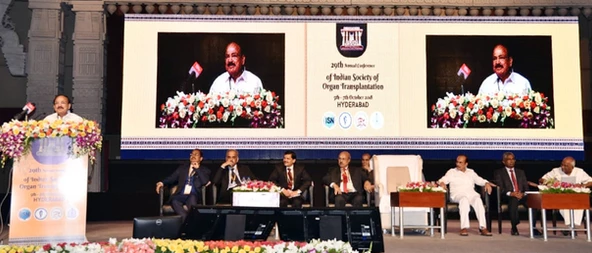
Make Organ Transplantation an affordable therapy: Vice President
The Vice President of India, Shri M. Venkaiah Naidu called for stepping up the campaign for organ donation in a big way to meet the huge demand due to rising number of end organ failures of kidney, liver, heart, lung and pancreas.
Addressing the 29th annual conference of the Indian Society of Organ Transplantation in Hyderabad today, Shri Naidu pointed out that although there was a huge requirement for donated organs in the country, only a miniscule number were getting them. “Of the 85,000 liver failure patients on waitlist annually, less than 3% get the organ. Similarly, while two lakhs kidney failure patients registered for organ transplantation, only 8000 get the kidney. And barely 1% get heart /lung amongst the thousands on waitlist,” he added.
The Vice President said though there was a huge leap in cadaveric organ donations in the last 4-5 years, the demand-supply remained hugely unmet because of low rates of organ donation at 0.8 per million population when smaller countries like Spain and Croatia were having rates of 36 per million and 32 per million respectively.
Observing that the significant gap in the country was due to cultural beliefs, traditions and ritual practices, he called upon the doctors, NGOs and others to make people aware of the importance of organ donation. He said “India is known for unity in diversity and altruism in all cultures and we need to increase the donation rates to meet the demand of organs for organ transplantation”.
Keeping the rising demand in view, the Vice President urged doctors and other health care delivery providers to focus on the preventive care and making transplantation an affordable therapy for all the needy people.
Emphasizing that prevention was better than cure, the Vice President said many end stage diseases can be prevented by lifestyle modifications. Expressing his concern over the increasing burden of non-communicable diseases, he told the medical fraternity to educate the people on the dangers of leading sedentary lifestyle, eating junk food and on excessive consumption of alcohol and tobacco.
Stating that Yoga has nothing to do with religion, he said people should be advised to practice yoga. He also asked the medical fraternity to educate people on reducing salt intake in view of its association with hypertension.
Referring to the lack of adequate healthcare facilities and manpower in rural areas, the Vice President suggested that it should be made mandatory for doctors to serve a minimum of 2-3 years in rural areas before giving the first promotion.
Lauding the Union Government for launching ‘Ayushman Bharat’ scheme to provide insurance cover to 10.74 crore deprived rural families, the Vice President described it as a “positive and progressive scheme. He said the Make in India programme should promote manufacturing medicines and devices in India at affordable prices
Observing that doctors are treated with reverence in India, he told them to treat patients with empathy and provide the much-needed human touch. Unfortunately, due to the present-day fast-paced lifestyles, doctors were not spending as much time as needed with each patient. This should change and doctors must spend more time with each patient like the family physician used to in the past, he added.
The Deputy Chief Minister of Telangana, Shri Mohammed Mahmood Ali, the President of Indian Society of Organ Transplantation, Dr. K.L. Gupta and other dignitaries were present on the occasion.
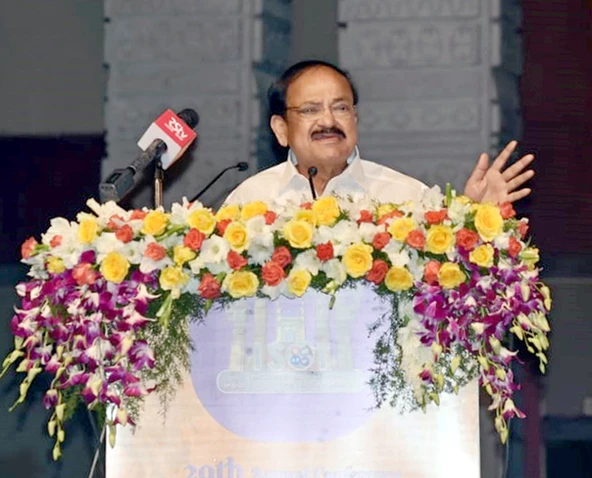
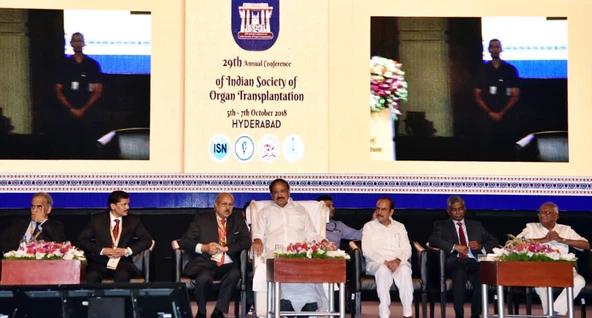
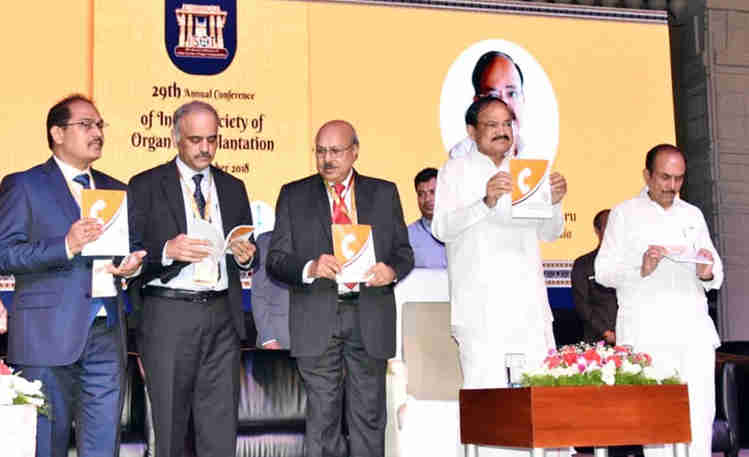
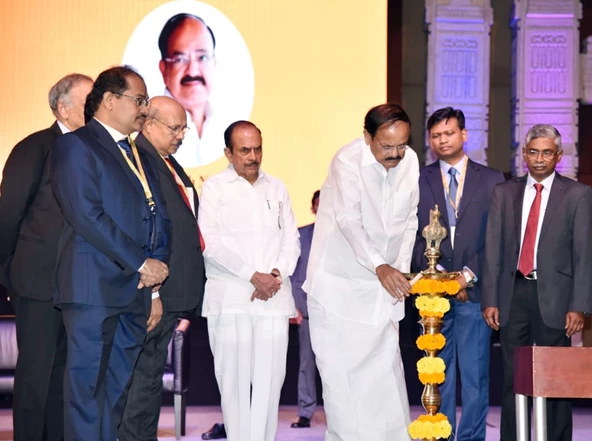
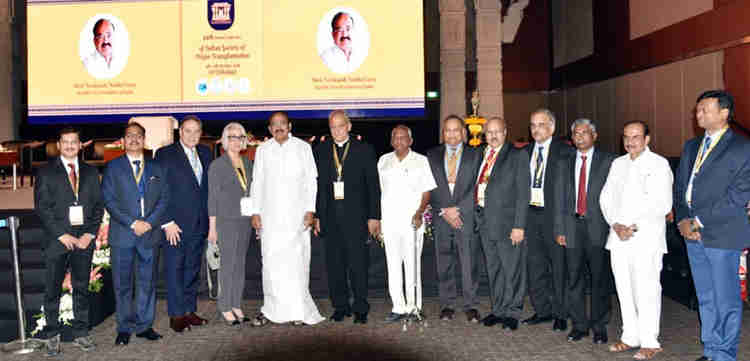
Following is the text of Vice President’s address:
“I am pleased to participate in the inaugural ceremony of the 29th conference of the Indian Society of Organ Transplantation Society.
As you all are aware, strong foundations in health and education sectors are vital for the progress of the nation.
Medicine is a noble profession and service is at the core of this vocation,
In India, a doctor is revered and treated like a demi-god. As professionals, you must always treat patients with empathy and provide them the much-needed human touch. Unfortunately, due to the present-day fast-paced lifestyles, doctors are not spending as much time as needed with each patient. This should change and doctors must spend more time with each patient like the family physician used to in the past.
While healthcare has been accorded utmost priority by successive governments since Independence, the challenges on this front continue to be daunting and formidable. The major challenges include low public spend, low doctor-patient ratio, low patient-bed ratio, dearth of medical colleges and trained doctors, inadequate infrastructure in rural areas, lack of penetration of health insurance and inadequate disease surveillance and preventive mechanisms.
We need a multi-pronged action to overcome the challenges in the health sector. The efforts of the government need to be supported by the private sector, voluntary organizations and even individual medical specialists. India is spending far less than the developed nations on healthcare goods and services. While the developed nations spend about 18 per cent of the GDP, India spends a mere 4.2 per cent.
In regard to the number of physicians available per 10,000 people, their number is grossly inadequate in India when compared to developed countries. While the number of physicians available is 20 per 10,000 population in developed countries, it is only six in India. The country needs 10.5 lakh doctors while we have only 6,5 lakh.
As against the WHO norm of one doctor per 1,000, there is one doctor per 1700 population in India. In order to reach this target, a high-level committee of erstwhile Planning Commission (Now NITI Aayog) has recommended the setting up of 187 more medical colleges by 2022.
I am sure, the Union Government and the State Governments will address this issue on a war footing and increase budgetary allocations for the health sector.
While we have done fairly well in controlling communicable diseases, the burden of non-communicable diseases is increasing and posing a major challenge to healthcare planners and professionals. Sedentary lifestyles, consumption of junk food, use of alcohol and tobacco are among the causes for an increase in NCDs in the country. This trend has to be reversed and people must made aware of leading healthy lifestyles by taking balanced diet and taking part in physical activities, including yoga.
The Global Burden of Disease (GBD) 2016 data shows that NCDs and injuries are the main cause of death among people of all age group in India.
In view of the low penetration of medical health insurance and an estimated 62.58 per cent of the people meeting medical and hospitalization expenses on their own, the Union Government has launched “Ayushman Bharat” to provide financial protection to 10.74 crore deprived rural families by offering a benefit cover of Rs. 5 lakh per family per year. It covers almost all secondary and most of the tertiary care expenses. Thus, it is expected to provide a fillip to India’s goal of achieving Universal Health Coverage.
It is unfortunate that even 71 years after attaining Independence, our villages lack adequate healthcare facilities in spite of the best efforts by Central and various State Governments. We cannot allow this kind of lop-sided development if the country has to make rapid progress. The absence of healthcare facilities in rural areas is one of the contributing factors for migration of people to cities. I have been suggesting that rural service should be made mandatory for MBBS doctors and also before giving the first promotion to those in government service.
Sisters and brothers, organ donation is one of the noblest causes. Today, with the development of science and advanced technology, the field of organ transplantation increased exponentially world over and in India.
With the increasing number of end organ failures of kidney, liver, heart, lung and pancreas, the demand for organs too been rising tremendously.
Although there is a huge requirement for donated organs in the country, only a miniscule number are getting them. Of the 85,000 liver failure patients on waitlist annually, less than 3% get the organ. Similarly, while two lakhs kidney failure patients registered for organ transplantation, only 8000 get the kidney. And barely 1% get heart /lung amongst the thousands on waitlist.
Though there is a leap in cadaveric organ donations over the last 4-5 years, yet the demand-supply remains hugely unmet with. This is because of low rates of organ donation in India at 0.8 /million population, when smaller countries like Spain and Croatia are performing at 36/million population and 32/million population respectively.
The significant gap in increasing end organ failures and the organ donations is because of cultural beliefs, traditions and ritual practices.
Sisters and brothers, please remember that India’s core philosophy is share and care and we need to step up the campaign for organs donation in a big way. India is known for unity in diversity and altruism in all the cultures and we need to increase the donation rates to meet the demand of organs for organ transplantation.
I am told that the actor such as lack of awareness, infrastructure, technical expertise, legal and police formalities and the need to use immune-suppression drugs for lifelong are among the reasons for low rates of organ donations in India.
There should be greater focus on increasing brain death declarations in a legal and ethical way, strengthening the infrastructure in all the hospitals for organ retrieval and transplantation, protective laws and free follow-up medicines.
To increase the donor pool, transplantation society and governments should work towards increasing donations after cardiac death (which is not frequent in India), promoting altruism-related donations, legalizing the donor-card and overcoming traditional beliefs by creating more public awareness.
Prevention is better than cure. Many end stage diseases can be prevented by the lifestyle modifications.
I am aware that Tamil Nadu runs one of the most successful cadaver transplant programs in India. Other states such as Andhra Pradesh, Telangana, Maharashtra and Rajasthan have also shown significant improvement.
I am also happy to know that few State Governments have brought all the organ transplantations and post surgery follow-up medicines under the health assurance and are providing completely cashless medical services to the poor and needy.
Various Initiatives of the Government of India such as Swatch Bharath and YOGA will help to prevent the diseases. Exclusive Department of AYUSH was created in the Ministry of health to increase the focus on traditional health systems which will be complementary to the allopathic systems in preventive and curative health care.
The wellness centers launched across India by the government of India will help to detect the diseases early, offer early treatment so that the diseases will not result in the end-stage failure.
The Make in India programme should promote manufacturing medicines and devices in India at an affordable price.
I would like all the doctors and other health care delivery providers to focus on the preventive care and make transplantation an affordable therapy for all the needy people.
I conclude by saying
Om Sarve Bhavantu Sukhinah Sarve Santu Nir-Aamayaah | Sarve Bhadraanni Pashyantu Maa Kashcid-Duhkha-Bhaag-Bhavet | Om Shaantih Shaantih Shaantih ||
Meaning: Om, May All become Happy, May All be Free from Illness. May All See what is Auspicious, May no one Suffer. Om Peace, Peace, Peace.
Promote preventive healthcare
The Vice President, Shri M. Venkaiah Naidu has called upon doctors to create awareness among the people on the dangers posed by lifestyle diseases and the need to promote healthy living.
Inaugurating a free Medical Camp jointly organized by the Asian Institute of Gastroenterology and the Swarna Bharat Trust (SBT) in the latter’s premises in Hyderabad today, he emphasized that people must made to pay greater attention towards their health and wellness as prevention is better than cure. He said that a healthy nation can become a wealthy nation but not vice- versa. The spending on healthcare will naturally come down if people are healthy, he added.
Expressing his anguish over the lack of adequate medical facilities in rural areas, he lauded the Union Government for launching Ayushman Bharat to provide health insurance cover to five crore families in rural areas and 2.5 crore families in urban areas. The scheme would provide coverage of up to Rs. 5 lakh per family per year. He also complimented the government for planning to establish one primary health centre for every 5,000 population and increase their number to 1.5 lakhs.
The Vice President expressed his deep appreciation to eminent gastroenterologist and Chairman, Asian Institute of Gastroenterology, Dr. D. Nageshwar Reddy for organizing the free medical camp at SBT. Lauding Dr. Reddy for being service-minded, he said such qualities must be imbibed by every healthcare professional.
Later speaking after giving away ‘Rythu Nestham’ awards, the Vice President warned that there was a danger of farmers leaving agriculture unless farming was made profitable and viable. He said the emphasis should be on bringing down the input costs and not only on increasing productivity. The indiscriminate use of fertilizers, pesticides, electricity and water also need to be curbed.
Referring to the initiative taken by him to conduct national consultations on making agriculture profitable, the Vice President said that scientists must ensure research outcomes must directly reach the farmers (Lab to Land).
Observing that zero budget natural farming promoted by eminent agriculturist, Shri Subhash Palekar was beneficial, the Vice President pointed out that it would help in reducing costs and providing a stable income to farmers. It would also protect the consumers from the ill-effects of pesticides. As a matter of fact, only 10 per cent of water and electricity would be required for natural farming when compared normal farming, he added.
The Vice President also stressed the need to create awareness among farmers to diversify to allied activities to increase their incomes. A study has shown that there were no suicides by farmers who had diversified to allied activities like poultry, dairy and fisheries, he added.
Lauding the Prime Minister, Shri Narendra Modi for increasing the MSP for various crops and for launching farmer friendly schemes like soil health cards and PM Krishi Sinchayee Yojana, the Vice President also appealed to the private sector to step up investments in agriculture. Similarly Parliament, press, and Planning Commission (NITI Aayog) should give top priority to agriculture.
Observing that the Government, Parliament and the Media must accord the highest priority to health, education and agriculture, the Vice President said that scientists, agricultural research centres and Krishi Vigyan Kendras must make concerted efforts to make agriculture sustainable and profitable.
The former Minister for Health and Medical Education, Andhra Pradesh, Dr. Kamineni Srinivas, eminent Gastroenterologist and the Chairman, Asian Institute of Gastroenterology, Dr. D. Nageshwar Reddy and other dignitaries were present on the occasion.


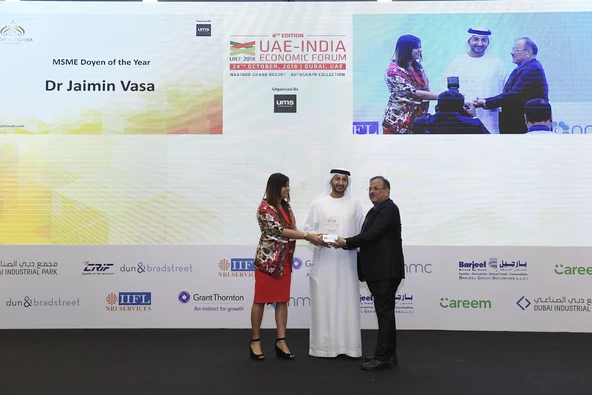
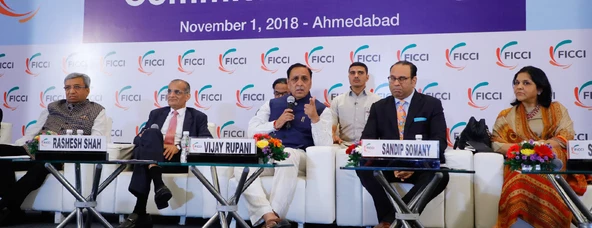
Leave a Reply